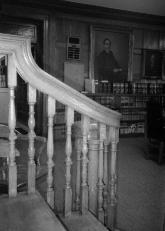We always appreciate the donation of new library materials.
Memorial. Consider donating a classic treatise in memory of a respected colleague, or to honor the passing
of your attorney-mentor.
Honorary. We also suggest donations in celebration of achievement—elevation to the bench, partnership,
and chairmanships are just a few successes worthy of permanent acknowledgment.
Sponsorship. A special gift to the Library and the entire legal community is the sponsorship of a treatise.
You or your firm provide the funds for the initial purchase, and may then choose to sustain the yearly
maintenance cost of the subscription. This way, not only do you enjoy the title, but you provide the Library
with a valuable resource.
USED BOOKS
We welcome your used law books. Changing your specialization? Retiring? Moving? Running out of space?
We’ll accept your used law books for resale to the legal community. You receive a tax deduction and a
colleague gets a set of books. What could be better!? We may even add your donation to the collection. We
particularly appreciate CLE materials and periodicals.
EQUIPMENT
Are you upgrading your office computer system, redecorating, or reorganizing? We may be able to use
your old furnishings or equipment. Give us a call!
INSURANCE POLICIES
If you have a paid-up life insurance policy that you no longer need, consider donating the policy and
claiming a charitable deduction for the present cash surrender value. For another option, you can designate
the Library the owner and beneficiary of a current policy you hold and deduct the annual premiums on
your income tax return.
MEMORIALS
On the passing of a friend, colleague, or loved one in the profession, many of us choose to make a lasting
contribution to honor that person’s memory. Consider contributions to The Nathan & Henry B. Cleaves
Law Library. Your name and that of your honoree will be printed on a memorial book plate. For
substantial donations, we will establish a separate endowment fund.
Cleaves Law Library Memorial Fund
Creation of the Cleaves Law Library Memorial Fund August 22, 2000
We, the Directors of the Nathan & Henry B. Cleaves Law Library, after due notice and consideration, do hereby vote to create the Cleaves Law Library Memorial Fund.
1. The name of the fund shall be the Nathan & Henry B. Cleaves Law Library Memorial Fund.
2. The principal purpose of the Fund is to provide a mechanism for persons to commemorate the lives of deceased members of the Bench and the Bar by assisting the library, in their memory, in carrying out its charitable, educational, and historical purposes.
3. The proceeds of the Fund shall be used to support the Cleaves Law Library in accordance with its Charter, and in that respect to solicit donations of and accept properties, monies, or securities by virtue of any gift, grant, bequest, devise, or otherwise, and to hold, control, administer, invest, reinvest and accumulate, and generally care for any and all funds and property, real and personal, which from time to time may be given, granted, bequeathed, devised, or otherwise conveyed or made available to the Cleaves Law Library Memorial Fund either unconditionally, upon conditions or in trust for specified purposes, and to disperse such funds and property or the income therefrom in aiding, supplementing, improving, enlarging, and carrying out the purposes of the Cleaves Law Library.
4. All the assets and earnings shall be used exclusively for the objects and purposes set forth above, including the payment of any expenses incidental thereto.
5. The Cleaves Law Library Memorial Fund shall be administered under the direction of the Board of Directors of the Cleaves Law Library.
Guidelines for establishment of a Named Fund
A Named Fund within the Memorial Fund may be established only with donated assets of $10,000 or more per fund.
A Named Fund may be proposed in a letter to the President of the Board of Directors, and must consist of at least $2,500 in cash and pledges at the time of the proposal. A proposed fund has three years from the time it is initially proposed to reach the minimum balance of $10,000. Once the minimum balance has been reached, the Named Fund will become a separate fund. If a proposed Named Fund does not reach the minimum balance in three years, the money received to date will be merged with the general Memorial Fund.
A Named Fund may be established for a specific project or special purpose only with donated assets of $20,000 or more per fund. Furthermore, acceptance of restricted donated assets must be approved by the Board of Directors of the Nathan & Henry B. Cleaves Law Library in order to confirm that the special purpose is consistent with the mission of the Library.
For More Information about the Cleaves Law Library Memorial Fund
These are some of the ways which you might donate to The Nathan & Henry B.
Cleaves Law Library. More information is available upon request, in confidence and with no
obligation, by contacting the Library. We will be happy to assist you in your giving. The Library is a non-profit 501(c)(3) organization. Contributions are tax-deductible to the fullest extent
allowed by law.
 Membership
Membership  Mission
Mission  History
History  Policies and Rules (including Computer and Internet Use)
Policies and Rules (including Computer and Internet Use)  Board of Directors
Board of Directors  Ways to Give
Ways to Give Cleaves Law Library Memorial Fund
Cleaves Law Library Memorial Fund Membership
Membership  Mission
Mission  History
History  Policies and Rules (including Computer and Internet Use)
Policies and Rules (including Computer and Internet Use)  Board of Directors
Board of Directors  Ways to Give
Ways to Give Cleaves Law Library Memorial Fund
Cleaves Law Library Memorial Fund